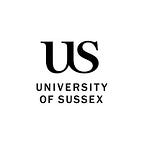“What did the Byzantines do for us?”
Professor Liz James, Head of the School of History, Art History, and Philosophy (HAHP) at the University of Sussex, reveals how looking at ancient cultures can help us understand current conflicts.
As an undergraduate, I found a lot of skeletons. I did my first degree in ancient history and archaeology, and all the digs I did were on Anglo Saxon sites. One of them, in Repton in Derbyshire, was a graveyard. You feel a bit odd digging up a person, but you do it respectfully and methodically, and once the bones have been analysed they get re-interred. I was a good digger, but I didn’t like the wet and the mud. We had to make drawings to scale, and the constant rain usually washed away my pencil lines.
Once you’ve seen one Greek temple, you’ve seen them all. That’s what I realised when I went on the British School at Athens Summer School. But then we were taken to Mistra, a deserted Byzantine town in the Peleponnese, and I thought, thank god, not another temple. This is much more interesting.
Because there are so few people studying Byzantine art, almost everything you do will be new and different. It’s not like studying the Classics, or the Renaissance, where it’s very difficult to say something fresh. The Byzantine period lasted from the 4th Century to the Middle Ages, and stretched from Turkey to Spain. There’s so much about it that we don’t know.
I’m trying to work out how people might have seen the world around them. Practically everything that has survived from the Byzantine period is Christian art, so it touches on all sorts of issues of faith and belief and the Byzantine attitude to the afterlife. In some ways it’s an impossible task because we will never know what they thought, but it’s still a question worth asking.
Unless we understand the past we don’t really understand the present. One of the things people ask is what difference did the Byzantine Empire make. I say that it was because of the Byzantines that Europe remained Christian in the Middle Ages. The history of Byzantium also helps to explain what happened in the Balkan crisis and the tensions between Greece and Turkey, and in Cyprus, and also the tensions in the Middle East and Syria, which was once a Christian country.
The point at which people stop being interested in what the world is like around them is the point at which they start blowing it apart, because they don’t care. As well as the appalling human cost of the war in Syria, it’s heartbreaking that so many treasured buildings and monuments have been destroyed, such as the Grand Bazaar in Aleppo, and parts of the ancient city of Palmyra.
Stripping a country of its heritage and its artifacts leaves it impoverished. I think we have to keep reminding people of that. It shouldn’t be a utilitarian world in which we do everything for the sake of economics and making money. Once you have money, what are you going to do with it?
The impact question for the arts and humanities works slightly differently to the sciences. We can’t say, “If I do this, then that will happen.” It’s not that straightforward. But we can show that what we do is just as intrinsic. History, art and philosophy are all about understanding people and why they might behave in the ways they do: how power works, how change happens, how ideas act in the world.
The United Nations Global Challenges, for example, are something that we in HAHP feel strongly about. We’re not setting out to solve world poverty or world hunger, but what we can do is play a role in reminding people about what is of value in their world, both from the past and what will be valuable in the future. The power of the humanities is that they allow us to reflect on what society is and should be, in a way that other disciplines cannot.
Interview by Jacqui Bealing
This profile is part of our This Sussex Life series.
Visit the University of Sussex website.
